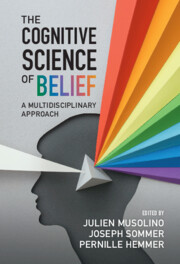Chapter 2 - The Cognitive Science of ‘Belief’ (The Word)
from Philosophical and Linguistic Approaches to Beliefs
Published online by Cambridge University Press: 03 November 2022
Summary
What concept does the word ‘belief’ express, and how does it fit into the Theory of Mind? In its repertoire of syntactic niches (some not noticed in the literature) and in its range from stereotypical to marginal cases, "believe" is quite a typical word. The analysis offered here reveals striking grammatical and semantic parallels to expressions that denote depictions, such as "picture," "map," and "performance." These parallels provide unexpected solutions to classical philosophical puzzles about "belief." The analysis is extended to other propositional attitude predicates, to speech–act predicates, to predicates of actional attitude such as "intend" and "vow," and to commitment to norms of all sorts. These conclusions provide a sense of the richness of folk psychology and of how detailed linguistic analysis can uncover it, presenting challenges for future research.
Information
- Type
- Chapter
- Information
- The Cognitive Science of BeliefA Multidisciplinary Approach, pp. 33 - 54Publisher: Cambridge University PressPrint publication year: 2022
